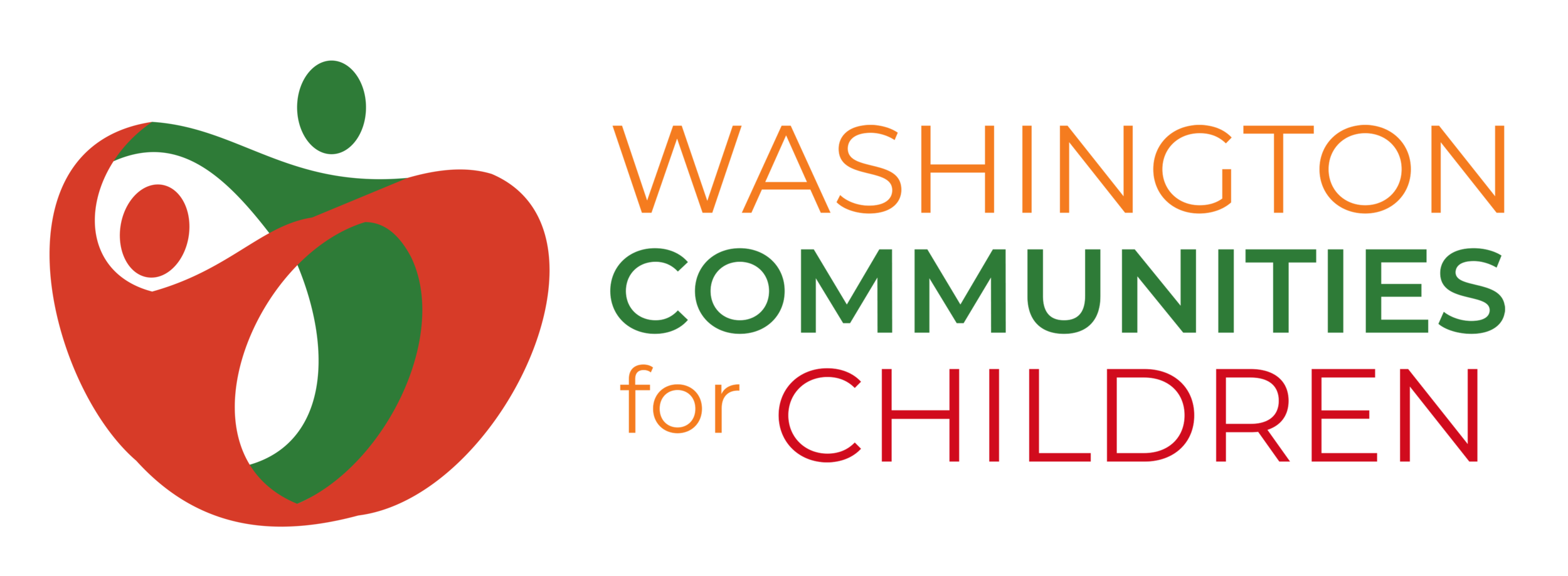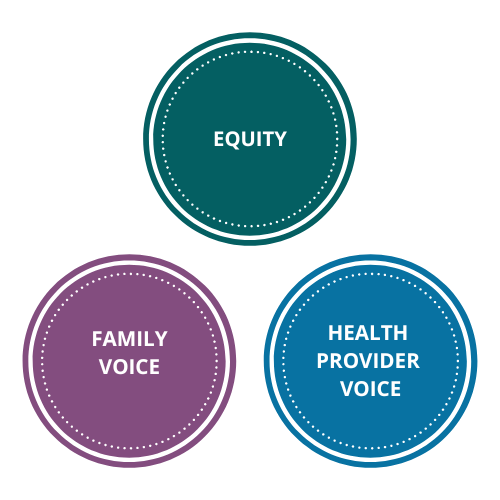CONFERENCE
SESSIONS
Choose from more than 15 sessions that will connect you to innovative ideas that are impacting children and families across Washington. Session topics have been designed around the six Washington Communities for Children Learning Networks. Pick your favorite topic for each Session Block or use the Learning Network icons to follow a track-specific curriculum. For added flexibility, some sessions are offered multiple times.
All sessionS qualify for 1.5 STARS hours credit.
Not Your Normal
Networking
We’ll be starting each morning with a little bit of fun!
READY TO JOIN THE FUN?
CONFERENCE SESSIONS
WEDNESDAY,
SEPTEMBER 28
Session block #1:
Wednesday, 9/28 | 1:00 – 2:30 p.m.
Introducing Strong Start: Washington State’s Universal Developmental Screening System
Developmental screening has never been more important. The pandemic has disrupted the lives of children and families, and that can hugely affect development. Young children need access to screening and supportive services at an age when interventions can have the greatest impact. And now we have a new tool to help make that happen! Join us for a Strong Start overview and demo, and to learn about resources available through the Washington State Department of Health (DOH) Universal Developmental Screening Program.
Washington State Department of Health
State of the Children: From Insight to Action
The State of the Children Tool Kit combines the lived experiences of children and families with data to make a compelling case to decision makers about how systems can better serve all children. Come to the session to learn about the tool kit, what it says, and how it was developed in collaboration with communities and advocates.
Soleil Boyd, washington stem
Liberatory Design and Impact Networks: Part 1
In this two-part session, come explore how to promote social change using the tools of Liberatory Design and Impact Networks. Part 1 will be a deep dive into the mindsets of both these tools.
WCFC Learning Network Facilitators
Session block #2:
Wednesday, 9/28 | 3:00 – 4:30 p.m.
The Road to Baby Lounges: Harnessing the Power of Family Voice through Data
Come learn how data collected through Family Connects and 2-1-1 lead to the creation of Baby Lounges, gatherings facilitated by health care professionals for caregivers of children infant to 1.
Emily Poncik, Family Connects
You Don’t Have to Be an Influencer: Social Media for the Rest of Us
Are you trying to expand your reach through social media, but you’re just not Elyse Myers (Seriously, look her up... You can thank us later.)? With the potential for social media to connect people in efficient, creative, and equitable ways, it can be a valuable tool for organizations. It also takes time and resources, which we know can be limited. Bring your questions and projects to this workshop-style session, and you’ll receive tips and tools for developing a social media strategy that works with your capacity and organizational goals.
amanda tuttle, a. tuttle design, inc
samantha codi walker, point north
Session block #3:
Wednesday, 9/28 | 6:00 – 7:30 p.m.
Connecting with Policymakers
Do you want to be more involved in your local and statewide policymaking, but you just don’t know where to start? In this training, Colleen and Brittany will teach you who to connect with, when to make contact, and how to do it comfortably. You will learn about the importance of local and statewide advocacy and how to make your voice heard.
Brittany Hartikainen and Colleen Condon, WCFC Policy & Advocacy Network Leaders
THURSDAY,
SEPTEMBER 29
Session block #4:
THURSDAY, 9/29 | 7:00 – 8:30 a.m.
Transforming Pediatric Healthcare in Pierce County: A Story of Addressing the Workforce Crisis through Collaboration
Learn how HopeSparks and Pediatrics Northwest are changing the trajectory for access to children's mental health care, and also addressing the workforce crisis, by intentional partnership through the Collaborative Care Model. In addition, learn how Community Health Workers at Pediatrics Northwest are helping to support families and relieve staff stress by implementing a team-based approach to addressing the needs of families with children birth to five.
Pediatrics Northwest and HopeSparks
Session block #5:
THURSDAY, 9/29 | 10:00 – 11:30 a.m.
Community Owned Resource Directories:
Where to Start
Come and learn from five communities who have begun to explore options for establishing a localized information directory.
Panel discussion facilitated by Jenny Nakata, Resource Navigation and Access Learning Network Leader
Unlearning Ableism
This session is designed to support participants' understanding of what ableism is, how it shows up in various settings, and how they can challenge ableism in their practices. We will explore such topics as working definition of ableism and consider several models of disability. It is possible that participants may experience discomfort during or after the presentation as we learn how we have perpetuated ableism ourselves. Discomfort is a normal experience as part of growth and the (un)learning process.
McKinley McPheeters, pierce county early childhood network (PCECN)
Session block #6:
THURSDAY, 9/29 | 1:00 – 2:30 p.m.
Equity in Workforce: Promising Policies to Retain Non-Profit and Social Service Sector Staff
The non-profit and social services sector is currently facing a staffing crisis. Learn from policy makers, organizational leadership, and community coalitions who are challenging long standing employment practices, to create a more sustainable and equitable workforce that supports working families.
Equity Learning Network Leader + Panel Discussion
Liberatory Design and Impact Networks: Part 2
In this two-part session, come explore how to promote social change using the tools of Liberatory Design and Impact Networks. Part 2 will build upon mindsets explored in Part 1. Participants will then apply the mindsets to a design challenge they are currently working on.
WCFC Learning Network Facilitators
Perinatal Mental Health Landscape in Washington State
This presentation will provide attendees with an overview of Perinatal Mental Health in Washington State. Learn about what national, state, and local resources exist for clients, as well as training and support opportunities for professionals. Learn how to connect the dots, ensure that families don't fall through the cracks, and professionals get the support they need.
Mia Edidin, Clinical Director at Perinatal Support WA
Session block #7:
THURSDAY, 9/29 | 3:00 – 4:30 p.m.
Why Fathering Not Just Parenting: Equity and Inclusion for What’s Best for Our Children
Join us for a conversation on what we know about the unique role of fathers and father figures in thriving children and families. We will look at the research and hear from a stellar panel of fathers with real-life experiences to guide our work. We will break into small discussions around our state’s New Father Friendly North Star Principles and how we each play a role in turning them from aspiration to action. We’ll consider the question: What do we need to think about around co-parenting as we work to transform our early childhood system?
WAshington Fatherhood Council
The Road to Baby Lounges: Harnessing the Power of Family Voice through Data
Come learn how data collected through Family Connects and 2-1-1 lead to the creation of Baby Lounges, gatherings facilitated by health care professionals for caregivers of children infant to 1.
Emily Poncik, Family Connects
Session block #8:
THURSDAY, 9/29 | 6:00 – 7:30 p.m.
Championing the Power of Parents in Systems Change
Join us for a conversation about what we can do to empower those with lived experience to take the lead in systems-change efforts. Parent champions from the WCFC network will share their firsthand expertise in navigating early childhood and family systems. We’ll get a glimpse of the barriers that exist for parents wanting to engage in community change strategies and consider together more equitable ways to let those closest to system impacts lead.
Panel and breakout discussions facilitated by Washington Communities for Children Caregiver/Parent Champions
FRIDAY,
SEPTEMBER 30
Session block #9:
friday, 9/30 | 10:00 – 11:30 a.m.
Unlearning Ableism
This session is designed to support participants' understanding of what ableism is, how it shows up in various settings, and how they can challenge ableism in their practices. We will explore such topics as working definition of ableism and consider several models of disability. It is possible that participants may experience discomfort during or after the presentation as we learn how we have perpetuated ableism ourselves. Discomfort is a normal experience as part of growth and the (un)learning process.
McKinley McPheeters, pierce county early childhood network (PCECN)
You Don’t Have to Be an Influencer: Social Media for the Rest of Us
Are you trying to expand your reach through social media, but you’re just not Elyse Myers (Seriously, look her up... You can thank us later.)? With the potential for social media to connect people in efficient, creative, and equitable ways, it can be a valuable tool for organizations. It also takes time and resources, which we know can be limited. Bring your questions and projects to this workshop-style session, and you’ll receive tips and tools for developing a social media strategy that works with your capacity and organizational goals.
amanda tuttle, a. tuttle design, inc
samantha codi walker, point north
Championing the Power of Parents in Systems Change
Join us for a conversation about what we can do to empower those with lived experience to take the lead in systems-change efforts. Parent champions from the WCFC network will share their firsthand expertise in navigating early childhood and family systems. We’ll get a glimpse of the barriers that exist for parents wanting to engage in community change strategies and consider together more equitable ways to let those closest to system impacts lead.
Panel and breakout discussions facilitated by Washington Communities for Children Caregiver/Parent Champions
Session block #10:
friday, 9/30 | 1:00 – 2:30 p.m.
Intro to the Enneagram: A Tool for Deepening Relationships and Building Trust
In order to collaborate well, partners need to know and trust one another. The Enneagram is a personality typing system that can be a powerful tool for self-discovery and team building. In this learning session, participants will discover the patterns associated with personality function, explore underlying behavioral motivations, and unlock the gifts we have to transform non-productive encounters with others.
rebekah jackson, harbor happiness
Demystifying Family, Friend and Neighbor Care
60-75% of young children are not part of formal early programs. Instead, they are cared for by Family, Friend & Neighbor caregivers (FFN) who are otherwise known as grandparents, aunties/uncles, siblings, good family friends. Join our workshop to learn more the most ancient and prevalent form of child care, why families choose FFN care for their children, who FFN caregivers are, and how supporting FFN caregivers advances racial equity. Bring your stories and ideas in how your program or coalition is supporting FFN caregivers and the children in their care.
Lisa Conley and Zivit Shechter Nissim, Child Care Resources
Beyond the Binary: LGBTQIA+ Family Inclusivity
In this session, participants will learn about the unique experiences and nuances of youth who identify within the LGBTQIA+ community and their families. This session will go over the data and trends we are seeing among LGBTQIA+ youth. Detailed examples and ways for providers to support these youth through at trauma informed and culturally responsive lens will be provided. All individuals in attendance will walk away with strategies and resources to successfully provide services to LGBTQIA+ youth and caregivers in an inclusive manner.
Aytch Denaro, MSW, LICSW, Clinical Social Worker, Mary Bridge Gender Health Clinic Tovah Denaro, Education and Behavioral Consultant
Connecting with Policymakers
Do you want to be more involved in your local and statewide policymaking, but you just don’t know where to start? In this training, Colleen and Brittany will teach you who to connect with, when to make contact, and how to do it comfortably. You will learn about the importance of local and statewide advocacy and how to make your voice heard.














